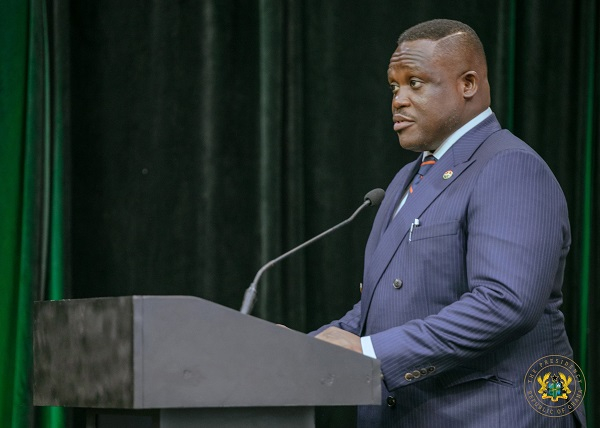The Minister of Communications, Digital Technology and Innovations, Samuel Nartey George, has urged telecommunication companies to improve their quality of service or face sanctions.
Speaking at a high-level meeting with the CEOs and technical teams of MTN, Telecel, and AT on Friday, May 30, Mr. George warned that operators who fail to improve network performance by the end of the year will face regulatory sanctions.
He said despite the visible presence and infrastructure of telcos across the country, customers continued to suffer from poor service quality, particularly in growing urban areas and key regional towns.
“We are not doing sentiments. We are doing engineering. If you have infrastructure in place but your service is poor, we must begin to take regulatory action,” Mr George stated.
The meeting featured a presentation by the National Communications Authority (NCA), based on a comprehensive assessment of 48 localities nationwide.
This study, prompted by a surge in public complaints, evaluated operators across four critical Key Performance Indicators (KPIs): 3G Coverage, Call Setup Time (CST), Mean Opinion Score (MOS) for call quality, and 3G Data Throughput.
The findings revealed alarming inconsistencies in service delivery across all three providers.
Mr. George, who also serves as the Member of Parliament for Ningo-Prampram, specifically cited examples from economically vital areas like Amasaman and East Legon, highlighting how, despite expanded coverage, the quality of service has sharply declined.
Parts of the capital, Accra, are experiencing frustrating network "blackouts" and substandard 4G performance.
The minister announced that a full nationwide test covering every district capital would be conducted by the NCA in the third quarter of 2025.
"On the basis of that result, if we don't see improvements, we will have to start taking decisive action," he warned.
In a potentially transformative policy, Mr. George disclosed that a portion of any fines imposed on defaulting telcos would directly benefit the public.
"About 40 per cent of any fines imposed on defaulting telcos would be returned to the affected consumers, either through bonus data or call time," he revealed.
This mechanism is designed to ensure tangible compensation for subscribers experiencing poor service, moving beyond mere regulatory penalties.
Operators have been granted a strict 30-day window, expiring June 30, 2025, to complete the acceptance process for newly allocated spectrum.
The minister stressed that by the end of December, a demonstrable improvement in service quality, directly linked to this new spectrum, would be expected.
"We know you can’t complete upgrades in three months, but we must see that the process has begun. The Ghanaian people must feel the impact of the spectrum rollout by the end of this year,” he underscored.
The telecommunications executives, recognising the gravity of the situation, outlined significant measures to address the concerns.
MTN Ghana CEO, Stephen Blewett, announced a substantial $230 million investment in 2024, earmarked for bolstering network infrastructure and IT systems. He also disclosed plans to open 300 new franchise stores, specifically targeting underserved areas, and recruit 400 new front-facing staff with a dedicated GH₵ 25 million internal budget. Upcoming self-service options, including SIM swaps and PIN resets with robust identity verification, are also in the pipeline to combat fraud.
Telecel Ghana Chief Operating Officer, Mohamad Ghaddar, reiterated his company’s commitment to superior customer experience, emphasising continuous network optimisation.
While acknowledging receipt of some spectrum, he stressed the ongoing need for more to meet burgeoning demand.
Telecel is expanding its retail footprint, with over 400 shops currently operational and plans to add 100 more.
The company also highlighted its support services for persons with special needs and welcomed regulatory feedback.
AT CEO Leo Skarlatos acknowledged the public as the "ultimate stakeholder".
He assured that AT is undergoing significant network improvements, which are anticipated to be "clearly visible by the first quarter of the following year."
Skarlatos expressed confidence in the ongoing transformation and extended an open invitation for stakeholders to witness these enhancements firsthand early next year.
Beyond service quality, the minister also touched upon data pricing.
He recalled the establishment of a committee in February 2025 tasked with developing a strategic roadmap for gradual data cost reduction.
This approach aims to avoid market shocks, prioritising improvements in value (e.g., more data for the same price) rather than immediate, drastic price cuts, to protect investment planning and industry viability.
This bold stance by the Ministry of Communication signals a new era of stringent regulatory oversight, prioritising consumer experience and holding telcos accountable for the quality of services they provide in Ghana's rapidly evolving digital landscape.





